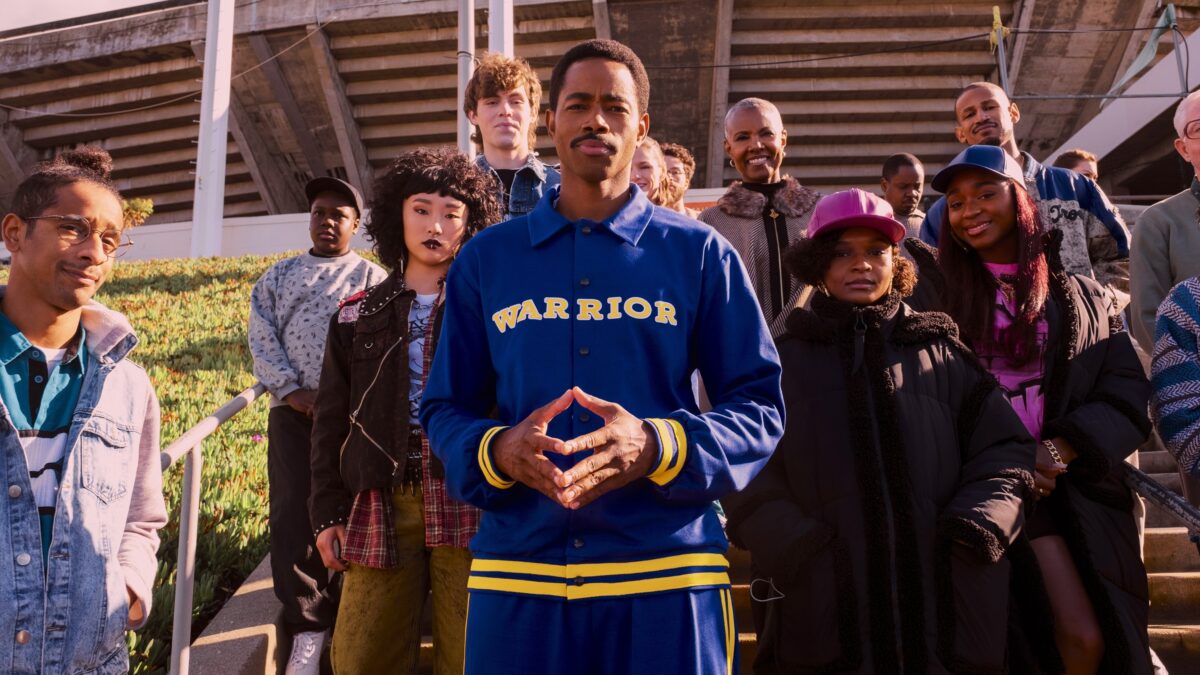It's kind of a freaky story
I use the term “Sundance-core” pretty frequently here on The Goods, and if you are approximately my demographic, you surely knew these movies well: those mid-to-late-aughts Indiewood dramedies that flooded out of Sundance and onto the last hurrah of Blockbuster shelves. Heavily inspired by Wes Anderson, especially Rushmore and Tenenbaums, these movies typically featured a heavy dosage of quirk and twee; coming-of-age themes; digital cinematography that looks a little washed out these days, needle drops from The Shins and other bands of that brood (“you gotta hear this one song, it will change your life, I swear”); and almost always some TV sitcom actor trying to make the leap to the movies. These films were often disposable and square. Their posters typically came in some shade of citrus.
And I loved them. Ever since Little Miss Sunshine indoctrinated me in 2006, I’ve had a soft spot for this breed of lightly melancholic, deadpan, flannel shirt dramedies. Critics rolled their eyes, but I happily binge to this day. So it’s no surprise I’ve got a lingering affection for directing duo Anna Boden and Ryan Fleck, who might be the platonic ideal of Sundance-core auteurs. They are not the best filmmakers of that wave, but definitely the most textbook: Half Nelson, Sugar, and It’s Kind of a Funny Story basically form a syllabus of the mid-’00s Sundance vibe on their own. If you’d told me in, say, 2015, that their career had crested and they were retiring into making commercials or something, I’d have believed you without hesitation. That was around the time the indie festival scene traded in the Juno aesthetic for a new flavor: book club-core. Everything started looking like Brooklyn and The Age of Adaline. One era of small-scale filmmakers packed away their Sony cameras and a new crop of directors arrived on the scene.
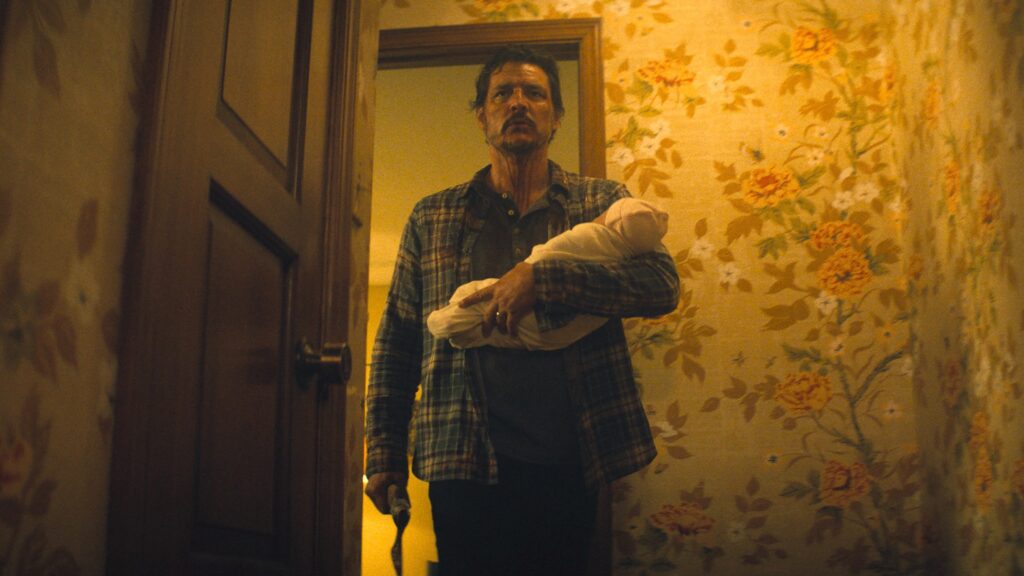
And yet, somehow, Boden and Fleck stuck around. I’m not entirely sure how, other than they must be really good in meetings. Their out-of-nowhere gig directing Captain Marvel sounds like someone dared Kevin Feige to hire the least superhero-ready duo he could find. That’s not a knock, exactly; it’s just that nothing in It’s Kind of a Funny Story screams high-budget CGI combat. Captain Marvel landed right in the crosshairs of the burgeoning online “M-She-U” tantrum. I haven’t seen it, but, by most accounts, it’s a pretty decent entry in the Marvel canon. It made a billion dollars and earned Certified Fresh on Rotten Tomatoes. That’ll keep a directing career alive.
Boden and Fleck haven’t returned to the MCU since, despite rumblings that they were in talks to helm a Disney+ show sometime around peak sourdough-starter season in early 2020. Instead, they rejoined to the indie scene during 2024 festivals with the mid-budget original Freaky Tales, which they wrote during lockdown. It falls halfway between their early drama-comedies and the splashy, comic-book residue from their Marvel outing.
Freaky Tales (absolutely atrocious title, by the way) is an anthology film set in 1987 Oakland. A glowing green force of supernatural justice guides the various protagonists. It’s an action-comedy swirl of cultural tribute and cartoon violence. The heroes are punk kids, rappers, basketball players, and movie-loving hitmen. The bad guys are Nazis and cops. Amen.
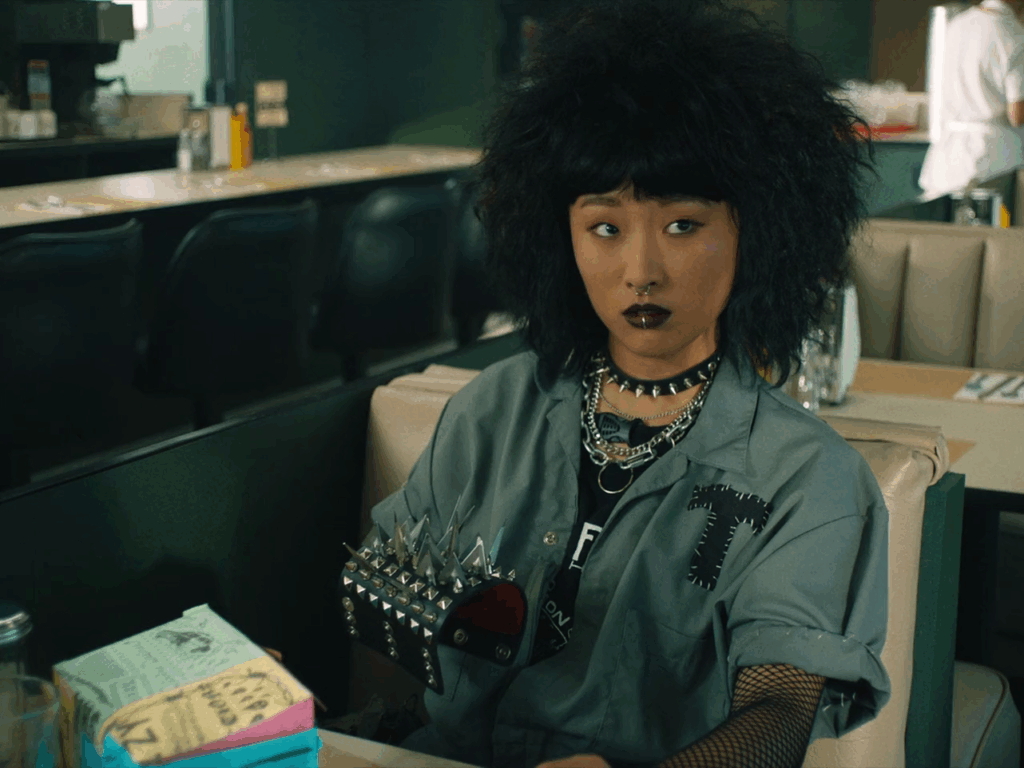
The film splits into four loosely connected chapters, each orbiting the same eventful night in Oakland, each escalating the film’s central mythos of rebellion.
The first, “Strength in Numbers: The Gilman Strikes Back,” centers on a pair of teenage punks, Tina (Ji-young Yoo) and Lucid (Jack Champion), who find themselves at ground zero for a neo-Nazi skinhead attack on the influential 924 Gilman punk venue. Their community bands together against an assault of skinheads. They also rock out to Black Flag.
The second story, “Don’t Fight the Feeling,” follows two aspiring rappers, Barbie (Dominique Thorne) and Entice (Normani), who tap into an inner wit and spirit to take down a misogynist in a rap battle.
In “Born to Mack,” we shift into a violent noir: Clint (Pedro Pascal), a reformed criminal grieving the death of his wife, finds out his baby survived and mounts a defiant stand against the gang trying to suck him back in.
Finally, “The Legend of Sleepy Floyd” (inspired by a real basketball player named Sleepy Floyd, played by Jay Ellis — the real-life Floyd cameos) offers the most heightened chapter, with the Golden State Warriors legend becoming a martial arts master to take vengeance on the thugs who killed his girlfriend.
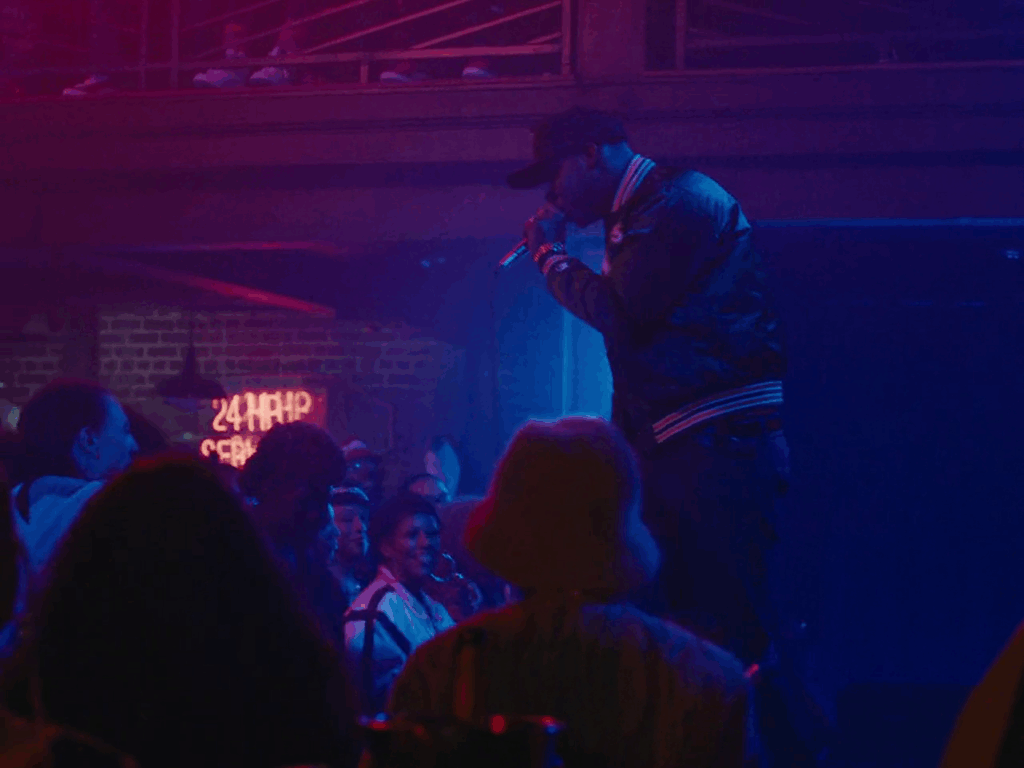
Freaky Tales is so drenched in homage that it barely functions as its own entity. This is both part of its charm and its ceiling. The references aren’t just frequent, they’re practically the point. You’ve got a heavy dose of 1979 film The Warriors, which is also sideways-referenced via the basketball team name. Boden and Fleck toss in Repo Man’s glowy alien weirdness and punk mindset, plus John Carpenter’s standoffish cool and quasi-dystopian worldbuilding. The nonlinear intersections recall Pulp Fiction — heck, a key scene is set at a diner.
From a texture standpoint, Freaky Tales feels spiritually closest to the moment in the late 2000s when comic book movies weren’t yet triple-A blockbuster fodder, but were riding a wave of post-Raimi Spider-Man edgy style adapting non-Marvel/DC properties. The film has some of the glossy stylization of Sin City, the playground caffeine energy of Scott Pilgrim, and the fetishistic violence of Kick-Ass. It’s not a direct ripoff of those, but it has the same playful spirit as all three.
It’s all very watchable, even compulsively so. The movie moves fast, throws in tons of action and visual style. It all pops with a charismatic cast. Boden and Fleck deliver on the genre demands, with fun action scenes that recall kung fu and samurai flicks. It seeks the unhinged faux-B-movie zeal of a midnight drive-in film of Quentin Tarantino and Robert Rodriguez’s Grindhouse, and it gets much of the way there.
But for all its zip and swagger, Freaky Tales is missing some substance under the hood. The stories are rarely more than sketches, never twisting the knife or digging in. The emotional stakes of each story are enough for functional narrative conflict and shape, but not enough to really hook you. Clint’s grief over his wife comes the closest to hitting hard, but even that melts away pretty quickly. The magical realism, indicated by a green glow, gives everything a sense of destiny and justice, but it also conveys as a deus ex machina — of course the good guys win if they have magic.
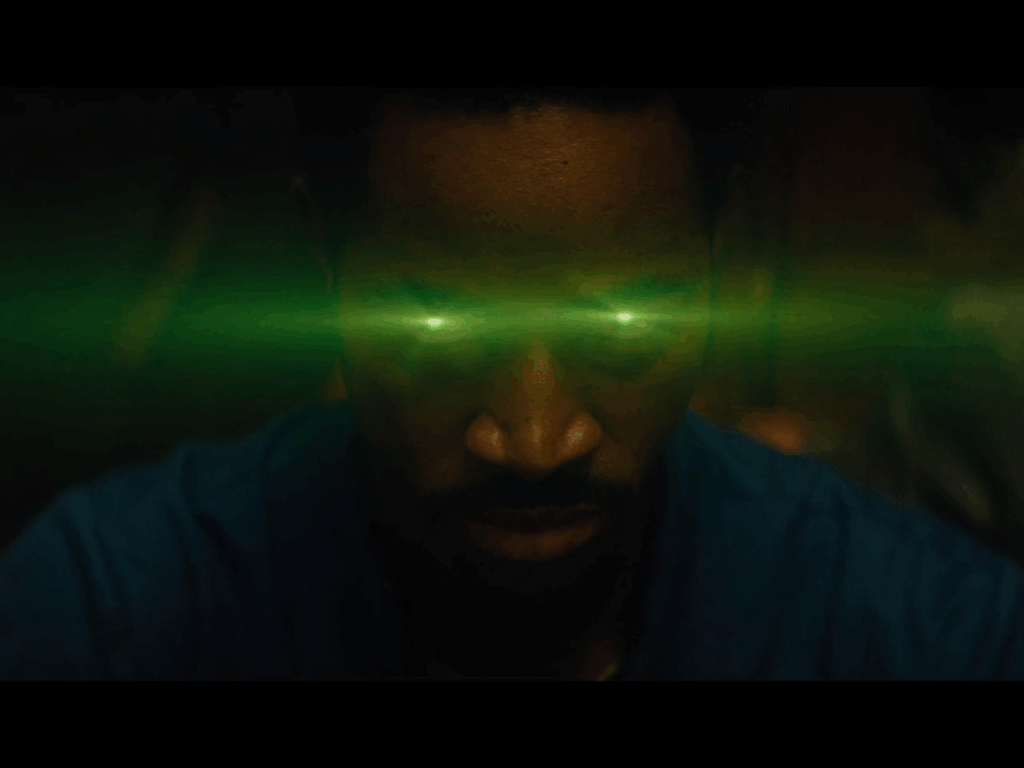
I vibed heavily with the film’s early stretch, but started checking out a bit as the movie progressed. This isn’t because the stories get worse — in fact, the third and fourth have the most depth — but because the narrative pattern locks into place and starts to feel safe. It’s clear that the film sees its green-glowing justice as a metaphor for progressive unity, a mystical current tying together Oakland’s outsiders and downcast. And while I’m on board with the sentiment, the execution is so tidily uplifting that it blunts the edge. These people and movements had dark sides and complexities not depicted here. The climaxes are all catharsis, no risk. Once you realize this is coming from the same duo that once made a quirky high school mental health dramedy, it clicks: their twee indie instincts never left, just moved to the shaggy action-comedy genre.
Still, there’s something admirable and infectious about how much Freaky Tales loves the films and culture it’s riffing upon. The punk show energy, the Bay Area specificity, the VHS haze of nostalgia (particularly a framing device that’s a mock ad for the movie’s green psychic magic) — it’s built into the film from the ground up, not tacked on. I honestly think the experience of watching it matches listening to a well-worn mixtape: old, familiar beats, but buoyed by the affection of the spirit that assembled them. Nonetheless, Freaky Tales reinforces what I already suspected about Boden and Fleck: They are not major artists. They are good, not great. Inventive, not electric.
The film’s large cast is a joy across the board. Pascal carries the film’s meatiest role in his continued rise to headliner, though he doesn’t quite have super-duper-star aura. Thorne and Normani are appealing as rappers, balancing swagger and vulnerability. And Champion and Yoo really charmed me as meet-cute punk-rockers. Marshawn Lynch pops in as a bus driver. It’s fun seeing Boden and Fleck regulars show up too: Keir Gilchrist from It’s Kind of a Funny Story gets a supporting role, and Ben Mendelsohn appears. No Brie Larson or Ryan Gosling from Captain Marvel and Half Nelson, sadly. But there is one notable casting that caught me off guard, a rare cameo appearance in a 2020s movie that made me gasp in surprise and almost choke up: the clerk at the video store visited in a couple stories is a familiar face I am surprised not to see in any of the movie’s marketing.
Freaky Tales isn’t quite a rich enough experience for me to get worked up about it completely flying under the radar, but it is solidly entertaining, and I think it would play as a crowd pleaser. It’s a well-paced, well-cast, lovingly busy and stylish slice of multi-genre pastiche. If nothing else, it’s fun to see a fresh film by a pair of Hollywood survivors I think of as old cinematic friends.
Is It Good?
Good (5/8)
Dan is the founder and head critic of The Goods. Follow Dan on Letterboxd. Join the Discord for updates and discussion.

